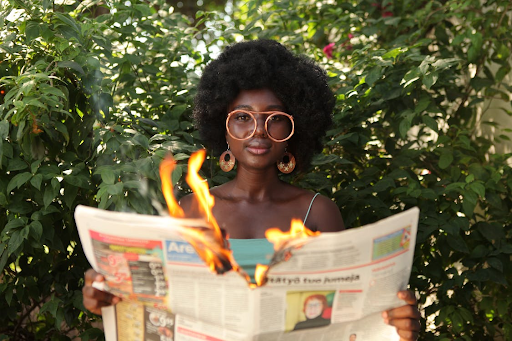
By Poppy Jackson
Podcast recommendations, the next viral recipe, or the serum that will finally rid me of my acne scars—TikTok has it all. Yet, when it comes to spreading global news, this short-form video content and its simple sharing and distribution methods are nothing short of dangerous. We’ve all fallen victim to the social media news circus, where celebrities propagate their own ignorance pertaining to politics, religion, and worldviews, often reaching a larger audience than traditional publications. When the Israel-Gaza conflict is at the forefront of public consciousness, TikTok is more than ever a necessary tool.
So why does this form of media consumption prove so unreliable?
Even before TikTok, it was difficult to find trustworthy, unfiltered news. A political, personal, or financial agenda is frequently present in the material provided. We are the short-form media generation, but there is no way to easily ingest coverage of conflict and catastrophe without making it appear reductive.
When we learn about these conflicts through news clips that have been cut and edited with flashy titles and ominous background music, we are actively partaking in the rapid dissemination of misinformation. Once something is published, printed, or even just typed onto a screen, it is easy to read it as the truth. I can just as easily post a video of women and children in distress with an array of misleading statistics as anyone with an interest in promoting their views can. And neither of us is required to verify or fact-check a single thing.
While the larger platforms like Facebook and Instagram claim they are ‘committed to fighting the spread of misinformation’ the lack of any actual verification is why extremists like Andrew Tate have been able to spread agendas of misogyny and violence masked as the ‘truth’ for so long. Until a real change in these sites’ policies is implemented, users across the world will continue to fall for false narratives.
We shouldn’t be able to ‘pick sides’ over a conflict like indifferently deciding whether to take sugar in our tea.
Yes, celebrities should use their platforms for advocacy, awareness, and the ‘greater good’. No, the ‘greater good’ shouldn’t prey upon an audience’s bias and ignorance. By now, most of us have been witnesses to the recent blunders of celebrities like Justin Bieber posting ‘Praying for Israel’ over an image of total destruction in Gaza or Jamie Lee Curtis posting brutalized Palestinian children under the belief that they were Israeli. Unsurprisingly, both were quick to retreat and delete once called out on their mistakes.
Celebrities wield huge influence over social media platforms, churning out every detail of their lives and every mundane thought. There’s a reason we call them ‘influencers’. Cult followers are quite literally ‘influenced’ into buying that product, using that affiliate link, liking that song, restaurant, or Botox specialist. The parasocial relationship formed between stars and fans relies on a perceived sense of trust and authority. However, when these influencers and celebrities spread misguided ‘facts’, this stream of misinformation only dilutes the genuine human suffering ongoing on both sides.
When we bring sensationalism, virality, and mass hysteria into the picture, ignorance pervades, and there is only further conflict. That’s not to say it’s all bad. TikTok provides a global platform to share, create, and educate. And, in terms of spreading information, it works. Young people are engaged—about 1.7 billion of us. We can be a part of the conversation, not just witnesses to it.
There is something to celebrate in the fact that the next generation is taking such an interactive interest in world events and, naturally, diverse viewpoints. I am not telling you to delete TikTok or unfollow every user who expresses their opinion. Nor should you take every condensed news segment to be falsified and every tweet to be a form of propaganda. Instead, I implore you to surround yourself with differing opinions and open up discussions that still allow room for disagreement. Allow yourself to change your mind or simply admit when you don’t know enough to form a concrete opinion. Or don’t! In an era where political agendas take precedence over human suffering, we should all be wary of what information we can rely on.
Consume critically, whether your source is a Twitter thread, a TikTok series, or an established journalist.
